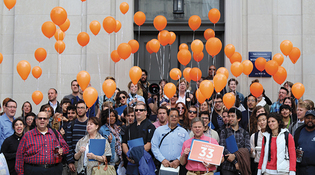 loading
loading
Light & VerityTAs in nine departments vote on unionizingYale is appealing the NLRB decison that permitted elections by department.  Amy Cheng ’19/Yale Daily NewsAfter TAs in several departments voted to unionize in February, members of Local 33 presented a petition on April 5 calling on the university to begin con-tract negotiations. View full imageUnion organizers at the Graduate School have been trying to establish a teaching assistants’ union for 25 years, with little success until now. On February 23, TAs in nine of the school’s 56 academic departments cast their votes, and most of those nine voted to unionize. But collective bargaining with the Yale administration is on hold while the parties await rulings on several contested legal issues, including ballot challenges in two departments. The election comes after an August 2016 decision by the National Labor Relations Board that teaching assistants at Columbia are employees, with the right to organize (“Teaching Assistants File Petitions to Unionize,” November/December 2016). In the last 16 years, the NLRB has reversed itself three times on the question of whether graduate students are employees under the National Labor Relations Act. Organizers at Yale used a novel strategy: they treated each department as a separate bargaining unit and petitioned the NLRB to hold individual elections in the nine departments. Yale challenged this “micro-unit” approach, but the regional director of the NLRB approved the nine micro-units, noting precedents in other industries for such a structure. The university has appealed that decision to the NLRB. (The union, Local 33 of the national union UNITE-HERE, was formerly known as GESO, the Graduate Students and Employees Organization.) Among the nine departments, TAs in English, geology and geophysics, history, history of art, mathematics, and sociology voted in favor of Local 33—the first votes for student unionization at Yale. (In 2003, GESO held an election for all TAs of the Graduate School and was voted down.) Physics TAs rejected the union. In the two remaining departments, political science and East Asian languages and literatures, the results are in dispute because of questions about who is eligible to vote. Local 33 included in its voting pool students who are TAs in the nine departments but are enrolled in one of the professional schools or a terminal master’s degree program at the Graduate School—for example, a School of Art TA for a Chinese course. Yale argues that those students should not be in the same bargaining unit as PhD students at the Graduate School. Local 33 leaders are excited about the election results. “I’m totally thrilled,” says cochair Aaron Greenberg ’18PhD. “It’s so humbling to be in the generation of graduate teachers that finally got to vote and win a union. It was a moment 25 years in the making.” Cochair Robin Canavan ’18PhD adds that “with the national mood right now, everybody is uncertain about jobs, the economy, health care, and divisiveness in politics. This is a very hopeful moment where we can ask what we can do locally and bring about change.” Graduate School dean Lynn Cooley, who opposes the union, says the micro-unit strategy was an unfair way to organize. “So few people got to vote on this, and it’s so important and so hard to reverse,” she says. “Ninety percent of doctoral students had no vote. In other elections—at Duke, Columbia, Harvard, NYU—you saw much broader units with thousands eligible to vote.” In the fall, the Graduate School Assembly passed resolutions opposing Local 33 and the micro-unit strategy. Local 33 leaders asked Yale to begin negotiations by April 12, but the university said the request was “premature” because of the questions pending before the NLRB. The NLRB was to hear arguments over the disputed ballots on April 24; Local 33 has now asked for negotiations to start on April 25.
The comment period has expired.
|
|